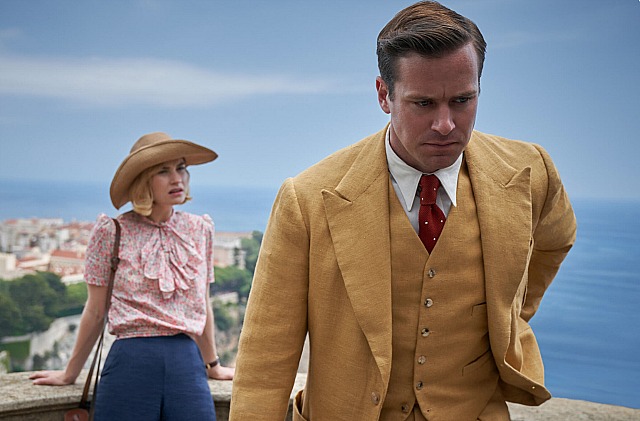Ben Wheatley‘s Rebecca (Netflix, 10.21) is more colorful and definitely more carnal than Alfred Hitchcock’s 1940 version. I’ll give it that much. Hitch’s film was shot in black and white and was fairly discreet depiction-wise. Not so the newbie.
There wasn’t a hint of a sexual current between Laurence Olivier‘s Maxim de Winter and Joan Fontaine‘s nameless protagonist in Hitch’s Oscar winner. All we see them do is briefly hug a couple of times. Olivier doesn’t even kiss Fontaine on the lips (or so I recall).
But in Wheatley’s version, the new Maxim (played with a muffled and unconvincing British accent by Armie Hammer) harpoons the nameless protagonist (Lily James) on a beach surrounding a Mediterranean cove. And in daylight yet. And in the 1930s, when nice girls the world over had been sternly instructed that sex happened only after marriage.

In both the Hitchcock and Wheatley versions, the nameless protagonist is later interrogated by an employer, a socially pretentious, middle-aged scold named Edythe Van Hopper, about her moral behavior. The line is the same in both films: “Tell me, have you been doing something you shouldn’t?”
In Wheatley’s version, the protagonist’s never-spoken answer could, in a more candid world, go something like “well, yes, I’ve been a bit naughty, I suppose…Maxim and I were at the beach a day or two ago, and we were lying on a blanket together…I won’t go into details but he hastily removed my bathing suit and ravaged me like a centaur.”
In Hitchcock’s version, Fontaine is offended that Mrs. Van Hopper would even ask such a thing, and it’s easy to believe that nothing whatsoever has transpired between she and Olivier.
The idea behind Wheatley’s film is to appeal to younger women who like hotsy-totsy romantic dramas, or the cinematic equivalent of Harlequin bodice rippers. That’s pretty much what the new Rebecca is. There’s nothing criminal about that. If younger women of a certain intellectual capacity enjoy Wheatley’s film, great.
I didn’t believe a second of it. Daphne du Maurier‘s original novel, published in 1938 and set in the mid ’30s, was very much of its time. You can feel the musty past in its pages, and you can certainly sense the conservative social norms and prim behaviors in Hitchcock’s film. The people who helped create the original Rebecca and especially those who performed in it were all part of that 80-year-old realm.
Wheatley’s version feels like a faint attempt to recreate that world without the slightest interest in really getting it right. The 1930s cars and costumes are correct as far as they go, but the feeling of that time is completely absent. Everyone is playing dress-up. The atmosphere is vapid. The actors behave as if they’re acting.
I was nauseated by a mustard-colored suit that Hammer wears during the opening Core d’Azur section. There’s no way Olivier’s Maxim would have glanced at such a thing, much less worn it. Mustard should be used only as an accent color.
For whatever reason Wheatley and screenwriters Jane Goldman, Joe Shrapnel and Anna Waterhouse have discarded the opening of Hitchcock’s version, in which Fontaine comes upon Olivier standing atop a Mediterranean cliff and seemingly contemplating suicide. Fontaine calls out “no…stop!”
When Olivier, Fontaine and the obnoxious Mrs. Van Hopper (Florence Bates) meet soon after in the lobby of their Monte Carlo hotel, the edge-of-suicide incident permeates the atmosphere, to put it mildly. It actually informs their relationship from that point on.
There’s definitely a sense of something ghostly in the Hitchcock film…a faintly spectral presence of some kind. There’s no overt suggestion of an actual ghostly figure but now and again you can sense something lingering, some aspect of the dead Rebecca that has hung on in some way. In Wheatley’s version there are some ghost bees, a CG swarm of some kind. There’s also a visual hint of something ectoplasmic in another scene.
Lily James (currently embroiled in a sex scandal with Dominic West, and hence not doing as much promotional press as she might have) is okay as the second Mrs. de Winter, but I didn’t believe she was a 1930s woman for one infinitesimal second. She’s strictly a 21st Century gal.
Hammer is miscast as Maxim — not believable as the Real English McCoy for a single instant. Kristin Scott Thomas isn’t bad as Mrs. Danvers, but she’s less spooky than Judith Anderson. and not as lesbianish. George Sanders delivered a much more engaging Jack Favell 80 years ago than poor Sam Riley manages in the current version. Ann Dowd‘s Mrs. Van Hopper struck me as overly coarse.
The 1940 Rebecca ran 130 minutes; Wheatley’s version is ten minutes shorter.









